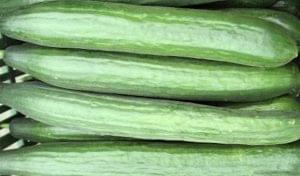Russian cucumbers flood the EU: the market for Polish producers is tense
Although the European Union’s sanctions policy on Russian agricultural products has tightened in several ways in recent years, a serious anomaly is now emerging in the case of fresh market cucumbers: according to EastFruit and FruitVeB, a record amount of snake cucumbers are flowing into Poland from Russia – which threatens the competitiveness of local farmers, producer organizations (POs) and traders – writes Agrárszektor.
 Based on data from GrowHow, Poland imported 2,100 tons of Russian cucumbers in March 2025, worth about 2.7 million euros – which is 2.5 times the volume in February. This means that Russian shipments accounted for 83% of total cucumber imports in March. The remaining volume came from Turkey, Belarus and Ukraine, while imports from EU countries were practically negligible – making Poland the number one EU target market for Russian cucumbers.
Based on data from GrowHow, Poland imported 2,100 tons of Russian cucumbers in March 2025, worth about 2.7 million euros – which is 2.5 times the volume in February. This means that Russian shipments accounted for 83% of total cucumber imports in March. The remaining volume came from Turkey, Belarus and Ukraine, while imports from EU countries were practically negligible – making Poland the number one EU target market for Russian cucumbers.
Hidden origin, hidden intention?
Although the Polish Food Quality Supervision Authority (IJHARS) confirmed that the 2,000 tons of Russian cucumbers inspected in the first quarter of 2025 legally complied with the requirements, in several cases irregularities were found in the origin marking. In some cases, the country of origin was completely missing, in others, the name of another state was mentioned on the documents. In addition, it is typical that Polish traders do not provide any information about the origin at all when selling in large batches.
This is especially wrong in light of the fact that Polish farmers have repeatedly protested against Ukrainian imports – but now the market is silent about the influx of products of Russian origin. According to EastFruit, it is increasingly likely that some of the large-volume Russian shipments are re-exported to other countries, already sold as “EU”.
Market confidence and a level playing field are at stake
The case once again highlights the critical issue of transparency of origin information in global agricultural trade. Polish producers may be at a disadvantage when faced with cheaper goods of uncertain origin – especially when imports are not accompanied by strict controls or when the origin is deliberately concealed.
There is increasing pressure from the Polish agricultural sector on the authorities to tighten traceability rules and consistently penalize importers who abuse origin marking. The development of the situation is of concern not only for Poland, but also for the entire EU cucumber market.
Related news
The economic sentiment index deteriorated in the euro area and the EU in February, but improved in Hungary
🎧 Hallgasd a cikket: Lejátszás Szünet Folytatás Leállítás Nyelv: Auto…
Read more >Walnuts are available at incredible prices
🎧 Hallgasd a cikket: Lejátszás Szünet Folytatás Leállítás Nyelv: Auto…
Read more >Related news
Festival buzz at the 60th anniversary EuroShop trade fair
🎧 Hallgasd a cikket: Lejátszás Szünet Folytatás Leállítás Nyelv: Auto…
Read more >Historic price reduction at ALDI
🎧 Hallgasd a cikket: Lejátszás Szünet Folytatás Leállítás Nyelv: Auto…
Read more >A stable compass in the Hungarian FMCG sector for 20 years
🎧 Hallgasd a cikket: Lejátszás Szünet Folytatás Leállítás Nyelv: Auto…
Read more >









